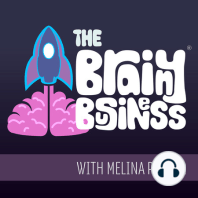34 min listen

256. Incorporating Habits Into Your Business Strategy (Refreshed Episode)
FromThe Brainy Business | Understanding the Psychology of Why People Buy | Behavioral Economics
256. Incorporating Habits Into Your Business Strategy (Refreshed Episode)
FromThe Brainy Business | Understanding the Psychology of Why People Buy | Behavioral Economics
ratings:
Length:
47 minutes
Released:
Jan 24, 2023
Format:
Podcast episode
Description
Habits are foundational to everything we do. When we think about habits we tend to think about the “bad” ones, things we want to change but there is so much more to it. Our brains run on habits, and without them, we couldn’t function. Many episodes of this podcast that have been dedicated to habits and related topics throughout the years, and this is the first one, which originally aired in the fall of 2019. Since then, I’ve interviewed habits expert Wendy Wood and discussed habits with Richard Chataway (links to their episodes in these notes). I included habits heavily in my books and the reason I chose to refresh this episode right now is because of this upcoming Friday’s guest. Cassie Holmes, the author of Happier Hour is my guest on Friday, and I thought that some reflection on habits is the best way to set you up to get the most out of that conversation. When you look at your day, what makes you happy? What is serving you and what isn’t? What has become a habit and what you should be more thoughtful about? This episode will help you in that process to understand further what a habit is, how they work, and what to keep in mind as you look to reinforce some and change others. The main thing to remember is that we need habits. They aren’t inherently bad. Most of them are good. Understanding them and leveraging them is where the opportunity lies. Show Notes: [00:37] Today’s episode is all about habits. Habits are foundational to everything we do. [02:45] You have a lot more good habits than bad ones. You just aren’t consciously aware of the vast majority of them. [04:27] Sorting by color is a form of habitual purchasing. Even with infrequent purchases, the place you go and look is based on habits. [06:25] The human brain essentially works on many many associations. [09:03] Up to 95% of all buying decisions are habitual. [11:09] Unfortunately the idea that it takes us 21-30 days to create a habit is wrong. [13:33] 21 days is not the magic number for making or breaking a habit. [15:16] A 2009 study from the European Journal of Social Psychology found the average number of days it took to form a habit was 66 days. (But don’t let that fool you…the range of data points matters!) [16:58] We approach habit changing all wrong. [18:20] Habits are made up of four phases: cue, craving, response, and reward. [19:31] Habits form because your brain is trying to find predictable ways to get rewards. A cue is a signal to the brain that there is a reward around and that instantly leads to craving/desire/filter for that item. [21:21] If you want to change a habit or start a new one, the cue and reward phases are driving the behavior. [22:44] Cues have been found to fall into one of five categories: location, time, emotional state, other people, and an immediately preceding action. [24:27] You aren’t craving the thing, but rather the reward it provides. [27:05] When we know the cue and the reward our brain wants we can work to change the habit. [29:31] One other crazy brain trick is word choice. [31:27] Saying “I don’t” is empowering. This was your choice. It affirms the choice you made and makes you feel determined and full of willpower. (This is very different from “I can’t.”) [33:12] You should be confident that you made this choice so you can firmly say “No, I don’t do that.” [35:04] We can check our notifications and emails every couple of hours or a couple of times a day (instead of every instant as we get continuous pings, dings and buzzes) and it will be fine. Once the cue is gone, we won’t look at our phones as much and we can be more productive. [38:07] Interrupting shoppers' habitual sequence can be a problem depending on your business positioning. [39:05] As the brand leader you don’t want to do too much to shake things up or rock the boat. [41:59] The habits of your current and potential customers are important to consider when building out your strategies. [42:28] Melina’s closing thoughts [43:29] We are
Released:
Jan 24, 2023
Format:
Podcast episode
Titles in the series (100)
25. Why Burnt Popcorn Has Derailed So Many Meetings - On The Sense Of Smell: This behavioral economics podcast continues our series about the five senses. Last week, I talked about the sense of sight. This week I’m talking about the sense of smell. No matter what type of business you have, these episodes will apply to you.... by The Brainy Business | Understanding the Psychology of Why People Buy | Behavioral Economics